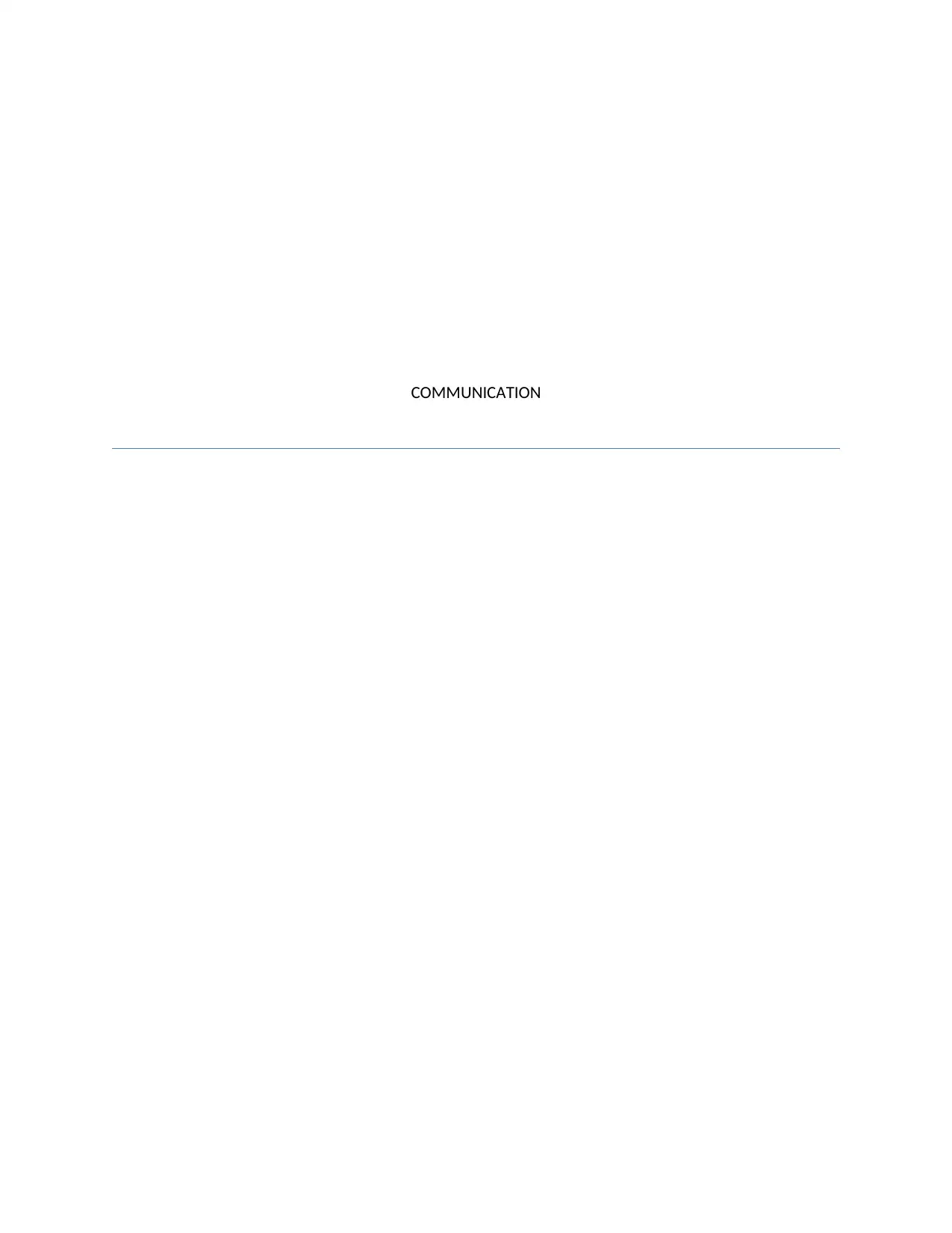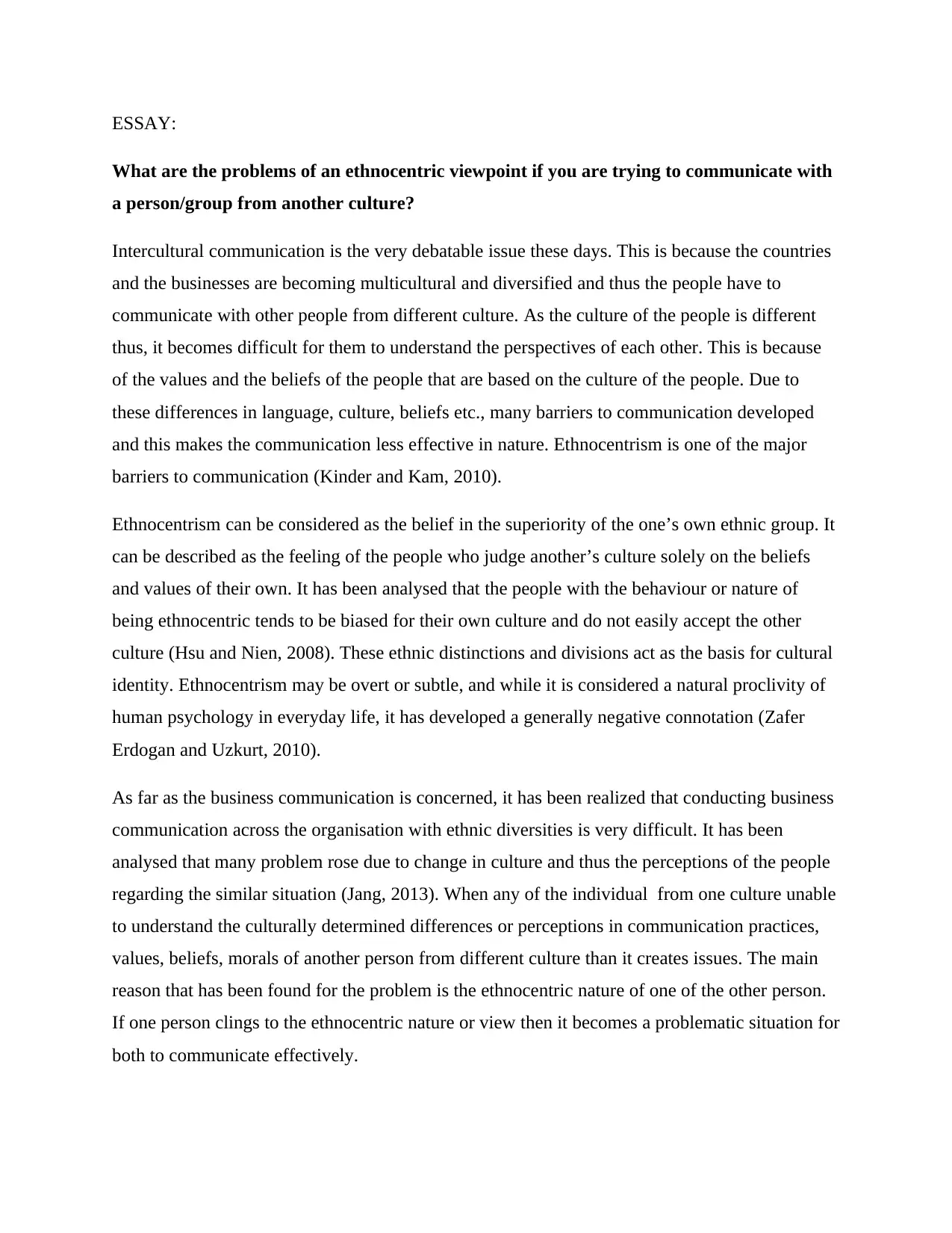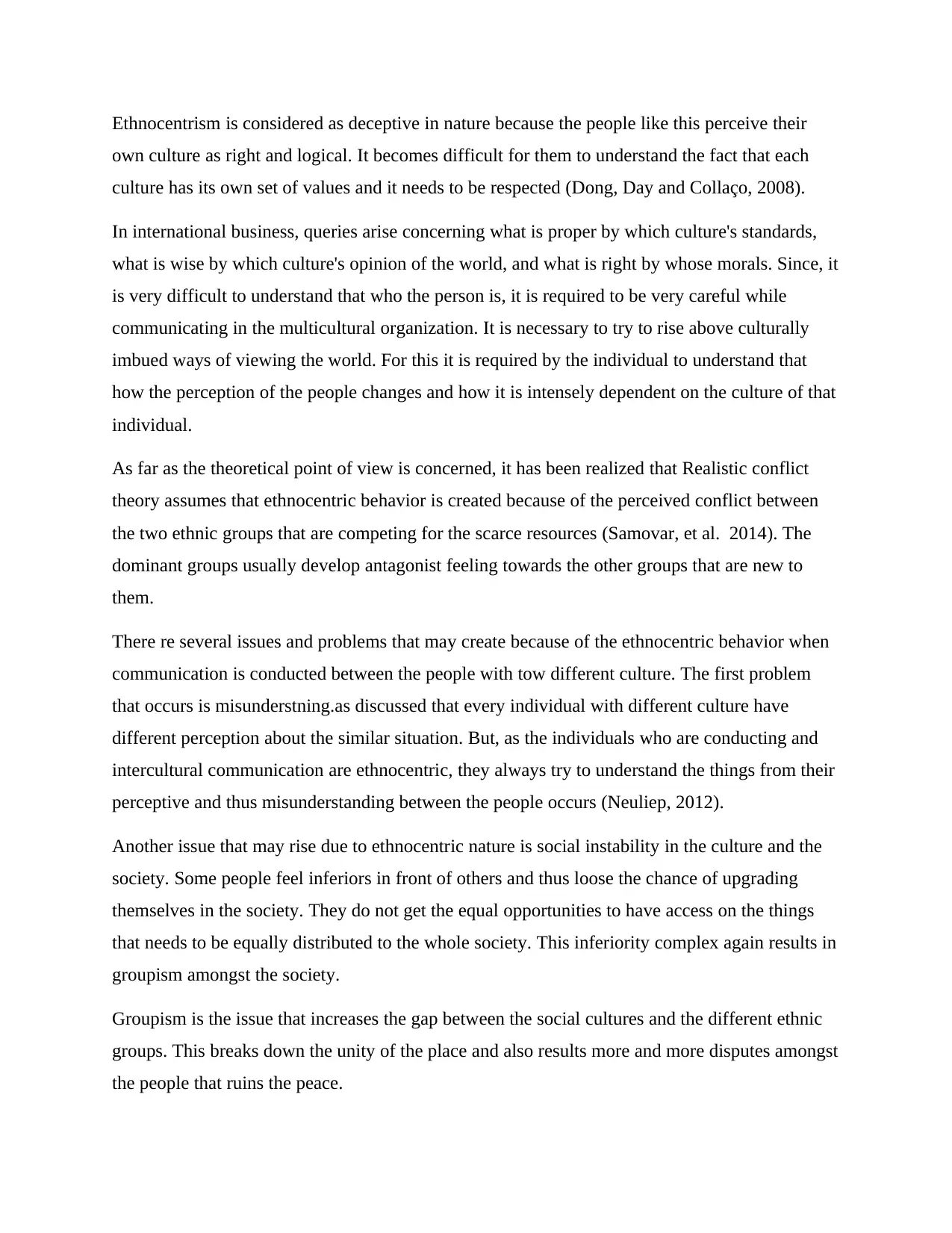COM102: Ethnocentrism Problems in Intercultural Communication Studies
VerifiedAdded on 2023/06/14
|5
|1363
|460
Essay
AI Summary
This essay addresses the problems associated with an ethnocentric viewpoint in intercultural communication, particularly in increasingly multicultural contexts. It defines ethnocentrism as the belief in the superiority of one's own ethnic group, leading to biased judgment of other cultures. The essay highlights how ethnocentrism creates misunderstandings, social instability, and inequality. It further distinguishes between implicit and explicit ethnocentric behaviors, noting the negative impacts on both societal harmony and organizational environments. The essay references Realistic Conflict Theory and emphasizes the need to respect diverse cultural values to foster effective communication and peaceful coexistence. Desklib provides access to similar essays and study resources for students.

COMMUNICATION
Paraphrase This Document
Need a fresh take? Get an instant paraphrase of this document with our AI Paraphraser

ESSAY:
What are the problems of an ethnocentric viewpoint if you are trying to communicate with
a person/group from another culture?
Intercultural communication is the very debatable issue these days. This is because the countries
and the businesses are becoming multicultural and diversified and thus the people have to
communicate with other people from different culture. As the culture of the people is different
thus, it becomes difficult for them to understand the perspectives of each other. This is because
of the values and the beliefs of the people that are based on the culture of the people. Due to
these differences in language, culture, beliefs etc., many barriers to communication developed
and this makes the communication less effective in nature. Ethnocentrism is one of the major
barriers to communication (Kinder and Kam, 2010).
Ethnocentrism can be considered as the belief in the superiority of the one’s own ethnic group. It
can be described as the feeling of the people who judge another’s culture solely on the beliefs
and values of their own. It has been analysed that the people with the behaviour or nature of
being ethnocentric tends to be biased for their own culture and do not easily accept the other
culture (Hsu and Nien, 2008). These ethnic distinctions and divisions act as the basis for cultural
identity. Ethnocentrism may be overt or subtle, and while it is considered a natural proclivity of
human psychology in everyday life, it has developed a generally negative connotation (Zafer
Erdogan and Uzkurt, 2010).
As far as the business communication is concerned, it has been realized that conducting business
communication across the organisation with ethnic diversities is very difficult. It has been
analysed that many problem rose due to change in culture and thus the perceptions of the people
regarding the similar situation (Jang, 2013). When any of the individual from one culture unable
to understand the culturally determined differences or perceptions in communication practices,
values, beliefs, morals of another person from different culture than it creates issues. The main
reason that has been found for the problem is the ethnocentric nature of one of the other person.
If one person clings to the ethnocentric nature or view then it becomes a problematic situation for
both to communicate effectively.
What are the problems of an ethnocentric viewpoint if you are trying to communicate with
a person/group from another culture?
Intercultural communication is the very debatable issue these days. This is because the countries
and the businesses are becoming multicultural and diversified and thus the people have to
communicate with other people from different culture. As the culture of the people is different
thus, it becomes difficult for them to understand the perspectives of each other. This is because
of the values and the beliefs of the people that are based on the culture of the people. Due to
these differences in language, culture, beliefs etc., many barriers to communication developed
and this makes the communication less effective in nature. Ethnocentrism is one of the major
barriers to communication (Kinder and Kam, 2010).
Ethnocentrism can be considered as the belief in the superiority of the one’s own ethnic group. It
can be described as the feeling of the people who judge another’s culture solely on the beliefs
and values of their own. It has been analysed that the people with the behaviour or nature of
being ethnocentric tends to be biased for their own culture and do not easily accept the other
culture (Hsu and Nien, 2008). These ethnic distinctions and divisions act as the basis for cultural
identity. Ethnocentrism may be overt or subtle, and while it is considered a natural proclivity of
human psychology in everyday life, it has developed a generally negative connotation (Zafer
Erdogan and Uzkurt, 2010).
As far as the business communication is concerned, it has been realized that conducting business
communication across the organisation with ethnic diversities is very difficult. It has been
analysed that many problem rose due to change in culture and thus the perceptions of the people
regarding the similar situation (Jang, 2013). When any of the individual from one culture unable
to understand the culturally determined differences or perceptions in communication practices,
values, beliefs, morals of another person from different culture than it creates issues. The main
reason that has been found for the problem is the ethnocentric nature of one of the other person.
If one person clings to the ethnocentric nature or view then it becomes a problematic situation for
both to communicate effectively.

Ethnocentrism is considered as deceptive in nature because the people like this perceive their
own culture as right and logical. It becomes difficult for them to understand the fact that each
culture has its own set of values and it needs to be respected (Dong, Day and Collaço, 2008).
In international business, queries arise concerning what is proper by which culture's standards,
what is wise by which culture's opinion of the world, and what is right by whose morals. Since, it
is very difficult to understand that who the person is, it is required to be very careful while
communicating in the multicultural organization. It is necessary to try to rise above culturally
imbued ways of viewing the world. For this it is required by the individual to understand that
how the perception of the people changes and how it is intensely dependent on the culture of that
individual.
As far as the theoretical point of view is concerned, it has been realized that Realistic conflict
theory assumes that ethnocentric behavior is created because of the perceived conflict between
the two ethnic groups that are competing for the scarce resources (Samovar, et al. 2014). The
dominant groups usually develop antagonist feeling towards the other groups that are new to
them.
There re several issues and problems that may create because of the ethnocentric behavior when
communication is conducted between the people with tow different culture. The first problem
that occurs is misunderstning.as discussed that every individual with different culture have
different perception about the similar situation. But, as the individuals who are conducting and
intercultural communication are ethnocentric, they always try to understand the things from their
perceptive and thus misunderstanding between the people occurs (Neuliep, 2012).
Another issue that may rise due to ethnocentric nature is social instability in the culture and the
society. Some people feel inferiors in front of others and thus loose the chance of upgrading
themselves in the society. They do not get the equal opportunities to have access on the things
that needs to be equally distributed to the whole society. This inferiority complex again results in
groupism amongst the society.
Groupism is the issue that increases the gap between the social cultures and the different ethnic
groups. This breaks down the unity of the place and also results more and more disputes amongst
the people that ruins the peace.
own culture as right and logical. It becomes difficult for them to understand the fact that each
culture has its own set of values and it needs to be respected (Dong, Day and Collaço, 2008).
In international business, queries arise concerning what is proper by which culture's standards,
what is wise by which culture's opinion of the world, and what is right by whose morals. Since, it
is very difficult to understand that who the person is, it is required to be very careful while
communicating in the multicultural organization. It is necessary to try to rise above culturally
imbued ways of viewing the world. For this it is required by the individual to understand that
how the perception of the people changes and how it is intensely dependent on the culture of that
individual.
As far as the theoretical point of view is concerned, it has been realized that Realistic conflict
theory assumes that ethnocentric behavior is created because of the perceived conflict between
the two ethnic groups that are competing for the scarce resources (Samovar, et al. 2014). The
dominant groups usually develop antagonist feeling towards the other groups that are new to
them.
There re several issues and problems that may create because of the ethnocentric behavior when
communication is conducted between the people with tow different culture. The first problem
that occurs is misunderstning.as discussed that every individual with different culture have
different perception about the similar situation. But, as the individuals who are conducting and
intercultural communication are ethnocentric, they always try to understand the things from their
perceptive and thus misunderstanding between the people occurs (Neuliep, 2012).
Another issue that may rise due to ethnocentric nature is social instability in the culture and the
society. Some people feel inferiors in front of others and thus loose the chance of upgrading
themselves in the society. They do not get the equal opportunities to have access on the things
that needs to be equally distributed to the whole society. This inferiority complex again results in
groupism amongst the society.
Groupism is the issue that increases the gap between the social cultures and the different ethnic
groups. This breaks down the unity of the place and also results more and more disputes amongst
the people that ruins the peace.
⊘ This is a preview!⊘
Do you want full access?
Subscribe today to unlock all pages.

Trusted by 1+ million students worldwide

The above discussed ethnocentricity is because of the differences in the culture and the beliefs.
There is different kind of ethnocentricity that distinguishes the society into implicit and explicit
society. In the condition of being explicit, the respondents have negative perceptions about the
outsider groups or other groups and they behave negatively towards them. Whole in case of
implicit ethnocentric behavior, the people with outsider group does not get the equal legal rights
and this results in segregating of the whole society on the basis of religion, education, housing,
participation etc (Arasaratnam and Banerjee, 2011).
This determines that ethnocentricity is not a negative word but it may create negatively in the
society if expressed in wrong way. Having superior perception about owns culture is not wrong
but disrespecting other’s culture and judging the people on the basis of own values and beliefs
create the difference in the society and ruins the peace (Arasaratnam and Banerjee, 2011). It is
not only in the society but if the intercultural communication occurs in the organization then the
scenario become worsen as the management finds it very difficult to deal with such ethnocentric
behavior of the people that spoils the organization and working environment of the company.
References:
Arasaratnam, L.A. and Banerjee, S.C., 2011. Sensation seeking and intercultural communication
competence: A model test. International Journal of Intercultural Relations, 35(2), pp.226-233.
Dong, Q., Day, K.D. and Collaço, C.M., 2008. Overcoming ethnocentrism through developing
intercultural communication sensitivity and multiculturalism. Human Communication, 11(1),
pp.27-38.
Hsu, J.L. and Nien, H.P., 2008. Who are ethnocentric? Examining consumer ethnocentrism in
Chinese societies. Journal of Consumer Behaviour, 7(6), pp.436-447.
Jang, S.M., 2013. Framing responsibility in climate change discourse: Ethnocentric attribution
bias, perceived causes, and policy attitudes. Journal of Environmental Psychology, 36, pp.27-36.
There is different kind of ethnocentricity that distinguishes the society into implicit and explicit
society. In the condition of being explicit, the respondents have negative perceptions about the
outsider groups or other groups and they behave negatively towards them. Whole in case of
implicit ethnocentric behavior, the people with outsider group does not get the equal legal rights
and this results in segregating of the whole society on the basis of religion, education, housing,
participation etc (Arasaratnam and Banerjee, 2011).
This determines that ethnocentricity is not a negative word but it may create negatively in the
society if expressed in wrong way. Having superior perception about owns culture is not wrong
but disrespecting other’s culture and judging the people on the basis of own values and beliefs
create the difference in the society and ruins the peace (Arasaratnam and Banerjee, 2011). It is
not only in the society but if the intercultural communication occurs in the organization then the
scenario become worsen as the management finds it very difficult to deal with such ethnocentric
behavior of the people that spoils the organization and working environment of the company.
References:
Arasaratnam, L.A. and Banerjee, S.C., 2011. Sensation seeking and intercultural communication
competence: A model test. International Journal of Intercultural Relations, 35(2), pp.226-233.
Dong, Q., Day, K.D. and Collaço, C.M., 2008. Overcoming ethnocentrism through developing
intercultural communication sensitivity and multiculturalism. Human Communication, 11(1),
pp.27-38.
Hsu, J.L. and Nien, H.P., 2008. Who are ethnocentric? Examining consumer ethnocentrism in
Chinese societies. Journal of Consumer Behaviour, 7(6), pp.436-447.
Jang, S.M., 2013. Framing responsibility in climate change discourse: Ethnocentric attribution
bias, perceived causes, and policy attitudes. Journal of Environmental Psychology, 36, pp.27-36.
Paraphrase This Document
Need a fresh take? Get an instant paraphrase of this document with our AI Paraphraser

Kinder, D.R. and Kam, C.D., 2010. Us against them: Ethnocentric foundations of American
opinion. University of Chicago Press.
Neuliep, J.W., 2012. The relationship among intercultural communication apprehension,
ethnocentrism, uncertainty reduction, and communication satisfaction during initial intercultural
interaction: An extension of anxiety and uncertainty management (AUM) theory. Journal of
Intercultural Communication Research, 41(1), pp.1-16.
Samovar, L.A., Porter, R.E., McDaniel, E.R. and Roy, C.S., 2014. Intercultural communication:
A reader. Cengage Learning.
Zafer Erdogan, B. and Uzkurt, C., 2010. Effects of ethnocentric tendency on consumers'
perception of product attitudes for foreign and domestic products. Cross Cultural Management:
An International Journal, 17(4), pp.393-406.
opinion. University of Chicago Press.
Neuliep, J.W., 2012. The relationship among intercultural communication apprehension,
ethnocentrism, uncertainty reduction, and communication satisfaction during initial intercultural
interaction: An extension of anxiety and uncertainty management (AUM) theory. Journal of
Intercultural Communication Research, 41(1), pp.1-16.
Samovar, L.A., Porter, R.E., McDaniel, E.R. and Roy, C.S., 2014. Intercultural communication:
A reader. Cengage Learning.
Zafer Erdogan, B. and Uzkurt, C., 2010. Effects of ethnocentric tendency on consumers'
perception of product attitudes for foreign and domestic products. Cross Cultural Management:
An International Journal, 17(4), pp.393-406.
1 out of 5
Related Documents
Your All-in-One AI-Powered Toolkit for Academic Success.
+13062052269
info@desklib.com
Available 24*7 on WhatsApp / Email
![[object Object]](/_next/static/media/star-bottom.7253800d.svg)
Unlock your academic potential
Copyright © 2020–2026 A2Z Services. All Rights Reserved. Developed and managed by ZUCOL.





